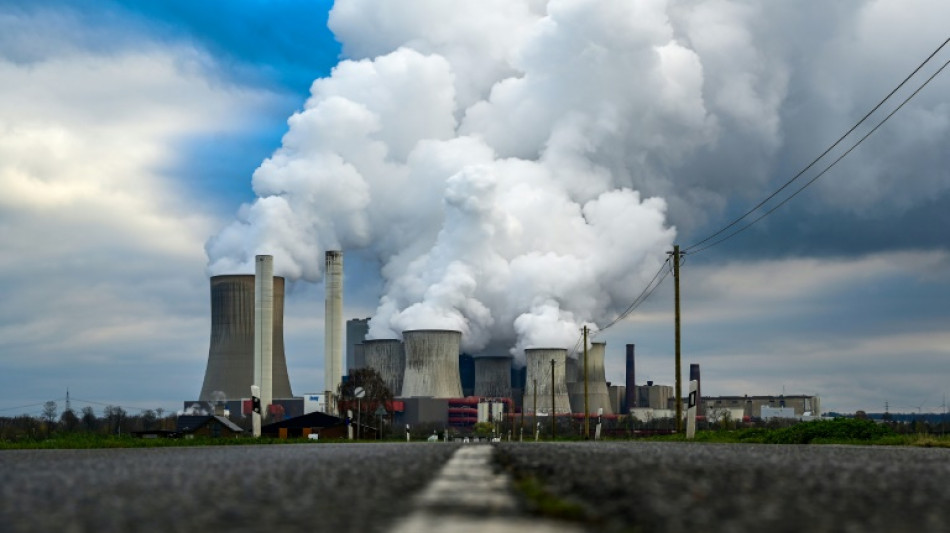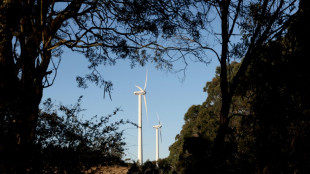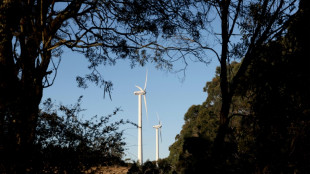
-
 Indian army says new exchange of gunfire with Pakistan
Indian army says new exchange of gunfire with Pakistan
-
Epstein accuser Virginia Giuffre takes own life in Australia: family

-
 Hundreds of buildings damaged, dozens injured in 6.3 Ecuador quake
Hundreds of buildings damaged, dozens injured in 6.3 Ecuador quake
-
India and Pakistan's Kashmir fallout hits economy too

-
 Francis's funeral to be grand farewell to 'pope of the poor'
Francis's funeral to be grand farewell to 'pope of the poor'
-
Pogacar faces defiant Evenepoel at Liege-Bastogne-Liege

-
 Chelsea eye great escape against Barcelona in Women's Champions League
Chelsea eye great escape against Barcelona in Women's Champions League
-
Iran, US to hold new round of high-level nuclear talks

-
 'Energy and effort' pay off for Reds as Blues' woes continue
'Energy and effort' pay off for Reds as Blues' woes continue
-
Albatross and closing birdie lift China's Liu to LPGA Chevron lead

-
 On the horizon? Wave of momentum for high seas treaty
On the horizon? Wave of momentum for high seas treaty
-
Developing countries should fast-track US trade deals: World Bank president

-
 Grizzlies' Morant 'doubtful' for must-win game 4 v Thunder
Grizzlies' Morant 'doubtful' for must-win game 4 v Thunder
-
Trump in Rome for pope funeral in first foreign trip of new term

-
 Trump says Russia-Ukraine deal 'very close' after new Kremlin talks
Trump says Russia-Ukraine deal 'very close' after new Kremlin talks
-
US rookies lead PGA pairs event with McIlroy and Lowry in hunt

-
 Trump tariff promises get a reality check
Trump tariff promises get a reality check
-
Warriors coach Kerr 'relatively optimistic' injured Butler will play game 3

-
 Postecoglou hopes 'Stonecutter's Credo' can inspire Spurs
Postecoglou hopes 'Stonecutter's Credo' can inspire Spurs
-
PSG lose unbeaten Ligue 1 record ahead of Arsenal showdown

-
 Venezuela accuses El Salvador president of 'human trafficking'
Venezuela accuses El Salvador president of 'human trafficking'
-
Own goal takes Sundowns to African final against Pyramids

-
 Scores of buildings damaged, 20 injured in Ecuador quake
Scores of buildings damaged, 20 injured in Ecuador quake
-
US stocks extend rally as market eyes busy calendar next week

-
 Pope's death triggers surge of disinformation he fought against
Pope's death triggers surge of disinformation he fought against
-
Rovanpera takes control of Rally Islas Canarias

-
 Zelensky insists Crimea is Ukrainian as US envoy meets Putin
Zelensky insists Crimea is Ukrainian as US envoy meets Putin
-
Patel and Mendis help Sunrisers beat Kings in Dhoni's 400th T20

-
 Copa del Rey ref statements 'unacceptable': Real Madrid after boycotting final build-up
Copa del Rey ref statements 'unacceptable': Real Madrid after boycotting final build-up
-
Insurance CEO's accused killer pleads not guilty to federal murder charges

-
 FBI arrests Wisconsin judge for shielding undocumented migrant
FBI arrests Wisconsin judge for shielding undocumented migrant
-
Brazil ex-president Collor de Mello jailed for corruption

-
 Zelensky insists Crimea 'belongs' to Ukraine as US envoy meets Putin
Zelensky insists Crimea 'belongs' to Ukraine as US envoy meets Putin
-
Real Madrid boycott Copa del Rey build-up over referee complaints

-
 Trinidad and Tobago votes for parliament, PM, with opposition in lead
Trinidad and Tobago votes for parliament, PM, with opposition in lead
-
IMF chief hails 'constructive' Spring Meetings held under tariff uncertainty

-
 Iran FM Araghchi in Oman ahead of nuclear talks with US
Iran FM Araghchi in Oman ahead of nuclear talks with US
-
Dozens of buildings destroyed, 20 injured in Ecuador quake

-
 Young Barca must 'enjoy' Real Madrid Copa final fight: Flick
Young Barca must 'enjoy' Real Madrid Copa final fight: Flick
-
Pakistan and India border closure separates families

-
 Brazil's Bolsonaro 'stable' after post-surgery setback
Brazil's Bolsonaro 'stable' after post-surgery setback
-
Catholics in secular Cuba hail Francis as 'bridge'

-
 US envoy Witkoff, Putin discuss 'possibility' of direct Russia-Ukraine talks
US envoy Witkoff, Putin discuss 'possibility' of direct Russia-Ukraine talks
-
Community seeks answers after French school knife killing

-
 German prosecutors seek jail terms in VW 'dieselgate' trial
German prosecutors seek jail terms in VW 'dieselgate' trial
-
Sabalenka makes winning start at Madrid Open

-
 EU, US should de-escalate and negotiate trade deal: IMF Europe director
EU, US should de-escalate and negotiate trade deal: IMF Europe director
-
Russia accuses Ukraine of killing general in car bombing

-
 Emery wants FA Cup glory and Champions League berth for Villa
Emery wants FA Cup glory and Champions League berth for Villa
-
Buildings destroyed, one injured in Ecuador quake


World could breach 1.5C warming threshold in 7 years: study
The world may cross the crucial 1.5C global warming threshold in seven years as fossil fuel CO2 emissions continue to rise, scientists warned Tuesday, urging countries at the COP28 talks to "act now" on coal, oil and gas pollution.
Battle lines are being drawn over the future of fossil fuels at the UN climate summit in Dubai, with big polluters trying to see off calls for an agreement to phase out the carbon-intensive energy responsible for most of human-caused greenhouse gas.
Fossil fuel CO2 pollution rose 1.1 percent last year, according to an international consortium of climate scientists in their annual Global Carbon Project assessment, with surging emissions in China and India -- now the world's first and third biggest emitters.
They estimated that there is a 50 percent chance warming will exceed the Paris deal's goal of 1.5 degrees Celsius over multiple years by around 2030, although they noted uncertainties around warming from non-CO2 greenhouse gases.
"It is getting more and more urgent," lead author Pierre Friedlingstein, of Exeter University's Global Systems Institute, told reporters.
"The time between now and 1.5 degrees is shrinking massively, so to keep a chance to stay below 1.5C, or very close to 1.5C, we need to act now."
- 'Wrong direction' -
The landmark 2015 Paris Agreement saw countries commit to limiting temperature rise to well below 2C above the preindustrial era and preferably 1.5C.
The more ambitious 1.5C goal has since taken on greater urgency as evidence emerges that warming beyond this could trigger dangerous and irreversible tipping points.
To keep to that limit, the UN's IPCC climate science panel has said CO2 emissions need to be halved this decade.
That is becoming a more challenging task as emissions continue to rise, the Global Carbon Project found.
Glen Peters, a senior researcher at the CICERO Center for International Climate Research, said carbon dioxide emissions are now six percent higher than when countries signed the Paris deal.
"Things are going in the wrong direction," he said.
That is despite a promising surge in renewable energy, a key issue at the Dubai climate talks where more than 100 countries have signed a call to triple renewable capacity this decade.
"Solar wind, electric vehicles, batteries, they're all growing rapidly, which is great. But that is only half the story," he said.
"The other half is reducing fossil fuel emissions. And we're simply not doing enough."
- India overtakes EU -
The research found fossil fuels accounted for 36.8 billion tonnes of a total of 40.9 billion tonnes of CO2 estimated to be emitted this year.
Several major polluters have clocked falling CO2 emissions this year -- including a three percent decrease in the United States and a 7.4 percent drop across the European Union.
But China, which accounts for almost a third of global emissions, is expected to see a four percent rise in fossil fuel CO2 this year, the research found, with increases in coal, oil and gas as the country continues to rebound from its Covid-19 lockdowns.
Meanwhile, a rise in CO2 emissions of more than eight percent in India means the country has now overtaken the EU as the third-biggest fossil fuel emitter, scientists said.
In both India and China increasing demand for power is outstripping a significant rollout of renewables, said Peters.
Emissions from aviation rose by 28 percent this year as it rebound from pandemic-era lows.
The research was published in the journal Earth System Science Data.
The Earth has already warmed some 1.2C, unleashing ferocious heatwaves, wildfires, floods and storms.
Temperatures this year have surged to the highest in recorded history and the UN's World Meteorological Organization has said 2023 was already around 1.4C above the pre-industrial baseline by October.
Going above 1.5C for a single year would not breach the Paris deal, however, which is measured over decades.
S.F.Warren--AMWN



